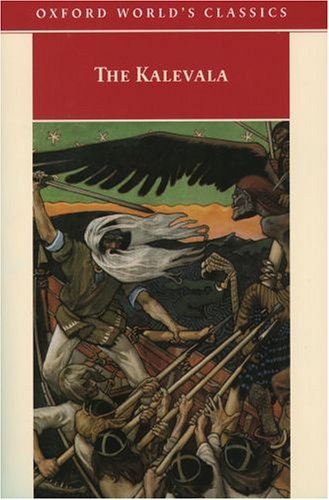Aaaaaah!!! The last week of classes is approaching! (Which does mean more time to do blogging and research and writing, I suppose. But also less discipline.)
And I'm finally un-distracted enough to finish reading the great epic poem of Finland, forged together in the 19th century from bits of folksong and mythology collected all over the land on a journey of skis and horses, all in a mad bid to create a genuine national identity.
But you know what? It worked! Today there's streets and paintings and people and even a whole national holiday in Finland named after the epic. It was a major influence for JRR Tolkien's Silmarillion, and even inspired an Estonian epic of the same ilk, The Kalevipoeg. And a Donald Duck comic, believe it or not.
And no wonder - this book is *nuts*. It starts off with the creation of the world from the shards of a duck egg and the weary, submerged, pregnant woman Ilmatar, and the birth of the hapless bard-hero Väinämöinen (it's pronounced "Viner-mer-nun", if this site's correct). Then we get cycle after cycle after cycle, showing how this hero's unable to woo a wife because he isn't good-looking, while the mage-smith Ilmarinen is beating out animals and miracles in his forge (even a genuine gold and silver Realdoll at one point) and Lemminkäinen drowns in a River of Death chasing a black swan only for his bits and pieces to be reanimated by his mother, because she can just DO THAT, and of course the mad blond super-strong boy Kullervo who does everything wrong, e.g. if you tell him to build a fence, he chops down a whole forest to make an unusable fence without doors that towers over the village, and if you give him a baby to sit he'll gouge out the baby's eye, and when he gets sold as a serf to Ilmarinen's wife she bakes him bread with a stone in it, and he's so mad when the stone breaks his father's knife that he drowns all her cattle, and turns a whole pack of wolves and bears into cattle, so that when she goes to milk her cattle for butter she finds them turning on her, ripping apart her beautiful face, pulling apart the sinews in her ankles, snapping her legs in two...
Yes, the story is quite graphic. This is all in strictly metrical poetry, by the way.
And presiding over everything is the dread Witch Queen of the Northland, Louhi, who has a number of beautiful daughters whom the heroes woo; who transforms herself into a bird and fights Väinämöinen for the magical artefact, the Sampo. That's what's being portrayed in the painting on the book cover, by the way.
Strange to consider the position of women in this tale. Women hardly get a say in The Iliad, but pretty much every later epic lends them a voice. And here, while they're being married off or just stolen, they do wail and complain and even cheat on their would be husband-rapists and get turned into seagulls. So there's some proactivity going on.
And intriguingly, women begin and end the tale. Marjatta, like Ilmatar, is a mother. In Canto 50, she appears as a Virgin Mary figure who becomes mysteriously pregnant after eating a lingonberry (watch out, Ikea food-lovers!) and gives birth to the infant King of Karelia, who can speak at the age of two weeks, admonishing Väinämöinen for his lack of respect to his better. And Väinämöinen wanders off into exile, grumpily, signalling that the age of heroes is past.
Ah, but is it? This poem is a celebration of poets and poetry: the heroes *sing things into other things*, i.e. they can sing a man deeper into the ice to kill him, or sing a wolf into the shape of a cow. The power of words, of imagination. And though Väinämöinen rescues the sun and dispels the demons of illness with the invention of the sauna, his greatest achievement is the invention of the kantele, a zither-like instrument inspired by the bones of the pike.
If poets still live, then are the heroes dead?
Someone oughta gather all the urban ghost stories in Singapore and see if we can make an epic poem out of that.
View Around the World in 80 Books!!! in a larger map
Representative quote:
The old man quickly christened
and briskly baptized the child
king of Karelia
guardian of all power. At that
Väinämöinen was angry -
he was angry and ashamed
and he stepped away
towards the shore of the sea
and there he started singing
sag for the last time -
sang a copper boat
a coppery covered craft
and he sits down in the stern
he cast off on the clear main
and eh uttered as he went
declared as he departed:
'Just let time pass
one day go, another come
and again I'll be needed
looked for and longed for
to fix a new Sampo, to
make a new music
convey a new moon
set free a new sun
when there's no moon, no daylight
and no earthly joy.'
Then the old Väinämöinen
goes full speed ahead
in the copper boat
in the coppery punt
to where mother earth rises
and heaven descends
and there he stopped with his craft
with his boat he paused; but he
left the kantele behind
the fine music for Finland
for the folk eternal joy
the great songs for his children.
Next book: Unt Mati's Things in the Night, from Estonia.

No comments:
Post a Comment